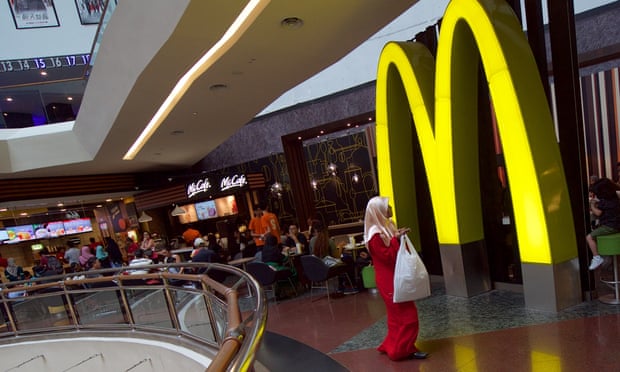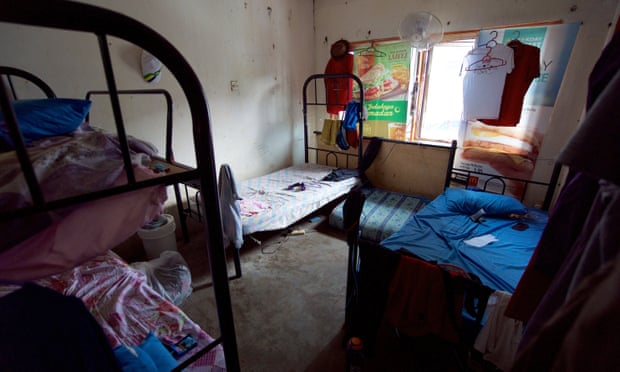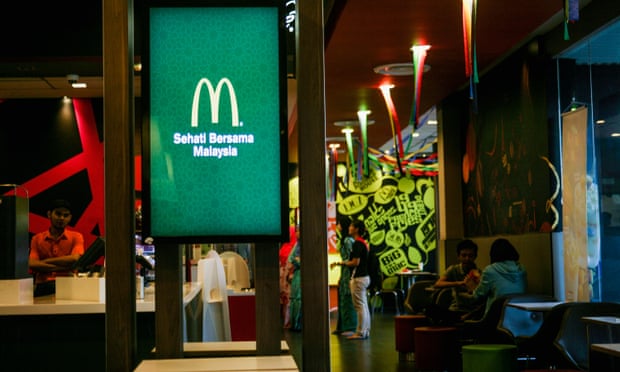Pete Pattisson
Migrant workers employed through labour supply firm allege they were deceived about wages, cheated of payments and had passports confiscated unlawfully
Workers at McDonald’s restaurants in Malaysia claim they earned as little as 60p an hour and were cheated out of months of salary, a Guardian investigation has found.
The workers allege they were subjected to months – and in some cases years – of exploitation by Human Connection HR, a labour supply company contracted by McDonald’s in Malaysia to provide workers to its restaurants in Kuala Lumpur.
The workers, who come from Nepal, say they had their passports confiscated, in contravention of Malaysian law.
They claim they were deceived about their wages and were charged additional fees when they arrived in Malaysia, resulting in a 25% deduction in their basic monthly salary. Over the course of working at McDonald’s, this equated to the loss of months of wages.
Unlike in its other major markets – including the UK and US – where McDonald’s operates through a franchise model, McDonald’s outlets in Malaysia are company-owned.
The migrants also say that their salaries were not received on time, leaving them unable to buy food or send money home to their families.
“We didn’t have the money to eat because we were not paid regularly,” said one man, adding that some workers went on strike earlier this year in protest at late payment of wages. “How can we go to work on an empty stomach? I thought it was a good company and I would earn good money. Now my life is damaged. I feel that I have no future.”
McDonald’s Malaysia said in an email that it had ended its contract with Human Connection. “At McDonald’s Malaysia, the welfare of staff is a top priority,” said the company. “Earlier this year, we became aware of certain circumstances relating to services provided by Human Connection HR which were not in compliance with our standards. As a result, we have terminated our contract with them.”
The investigation, which comes just days after the Guardian exposed allegations of abuse among migrants making products for Samsung and Panasonic in industrial zones across the country, sheds further light on the malpractice of some labour supply agencies used by major international brands in Malaysia.
“We were not given our salary on time,” said another Nepalese worker. “When we went to meet the managers of McDonald’s to complain, they usually said we were not employed by McDonald’s and they are not responsible for anything. One of my friends even went to the McDonald’s manager crying after he heard news of his child’s death [at home in Nepal]. He asked him to ask for his passport [from Human Connection, so that he could attend the funeral,] but the McDonald’s manager said that he cannot do anything. I would rather die than go back to work at McDonald’s. I will never work there [again].”
 |
| McDonald’s Mid-Valley in Kuala Lumpur. Migrant workers employed here (not pictured) claim they were paid erratically by the labour supply firm that hired them. Photograph: Pete Pattisson |
The Guardian spoke to 15 Nepalese workers formerly employed at four McDonald’s restaurants in the capital, Kuala Lumpur. The men worked at McDonald’s at different times over the course of three years.
More than half said that they had been forced to run away from their jobs without their passports or back pay, entering the illegal work market in an attempt to make some money. This would leave them vulnerable to arrest and detention by the Malaysian authorities.
Others said they had been forced to pay their own way back to Nepal after their passports were not returned by Human Connection.
Some of the workers criticised McDonald’s for failing to respond to complaints of mistreatment by Human Connection while they were working in McDonald’s outlets.
They claim that they repeatedly informed the company about problems relating to wages, salary deductions and passports, but received no assistance.
“I complained about our salary to McDonald’s many times, and the branch manager … sent the message to McDonald’s headquarters,” said one worker. “[But] McDonald’s said they had already paid Human Connection.”
The manager of one McDonald’s branch that previously employed some of the workers claims that the company’s headquarters in Malaysia were informed about the problems the men faced: “The labour supply company withheld two to three months’ wages. The workers only had a photocopy of their documents, but they should have had the original with them. We are humans. We tried to help them with food, but you can’t do it all the time.”
During their time working in McDonald’s restaurants, the men claim they were paid less than they were promised in Nepal. In some of their contracts it states that they would not have to pay the foreign worker levy, a charge placed on companies using migrant labour in Malaysia that is often passed on to the workers themselves. Payslips seen by the Guardian show that the levy was deducted, however, equating to a 25% reduction in their basic wages.
The workers also claim that they had their passports confiscated by the labour supply company on arrival in Malaysia, a pervasive but illegal practice that ties them to their employer and denies them the freedom to leave their job or the country.
“The supply company took our passports, but they will not send workers back to Nepal or give our passports back,” said one man formerly working at a McDonald’s restaurant. “Even those who finished the three-year contract cannot go home because they don’t have their passports.”
Another worker said: “Even when it is time to go, the company does not return your passport. I don’t know why … I asked to go home, but the company said they will not send me back.”
The workers who chose to return home have had to pay the equivalent of two months’ basic wages to a middleman to arrange the documents and paperwork needed to get them back to Nepal without their passports.
“I expected to earn money here,” said one. “But I’m leaving with nothing.”
The men also complained about the conditions they faced in the accommodation provided by Human Connection while they worked in McDonald’s restaurants.
 |
| A hostel used by Nepalese migrants working at McDonald’s in Kuala Lumpur. The workers say up to 18 men shared the space, with most sleeping on the floor. Photograph: Pete Pattisson |
The Guardian visited one squalid hostel with paint peeling off the damp walls. McDonald’s advertising banners were used as makeshift curtains. In one room, a McDonald’s trophy was propped up on a fan switch with “Best of the Best Kitchen Crew” printed on its base. At one point, the workers say, 18 men were crammed into the small flat, with most sleeping on mattresses on the floor. They shared one small, grimy toilet, which also passed as a washroom.
In a statement, McDonald’s said: “While local employees make up the vast majority – more than 90% – of our workforce, we sometimes work with established recruitment agencies which employ foreign workers, and sub-contract a number of them to McDonald’s in Malaysia. These staff members are employees of the recruitment agency, not McDonald’s.
“McDonald’s Malaysia made repeated attempts with Human Connection HR to investigate and verify issues of non-compliance shared by the workers, raising our serious concerns through both verbal and written correspondence. Because the workers are not employees of McDonald’s, our efforts to address the issues were unsuccessful, as were proposals for McDonald’s to assume responsibility for paying workers directly. In the interim, to assist, we authorised restaurants to provide food and provisions to workers affected while we worked to address the issue.
“Following the termination of our contract, the workers remain employees of Human Connection HR and as such we understand that they will either return to their home country or be redeployed to other businesses.”
Human Connection did not respond to a request for comment on the worker’s allegations.
Aidan McQuade, director of Anti-Slavery International, said businesses must no longer hide behind codes of conduct but should instead take proactive measures to ensure they are not profiting from exploited labour.
“The great tragedy about this kind of exploitation is that it is actually easy to fix,” he said. “Companies operating and profiting from their business in places like Malaysia can’t say that they are not aware of the issues facing migrant workers there. They need to take a proactive investigative approach to ensuring that, if they use labour supply companies, those companies are adhering to the law and corporate codes of conduct. It’s time for this to stop.”


No comments:
Post a Comment